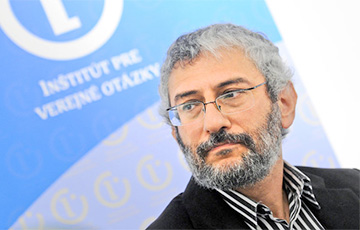‘Israel's Attitude Towards Russia Has Changed’
- 2.10.2024, 17:32
- 33,708

Why are Russian and Lukashenka propagandists happy about Iran's missile strikes?
Iran launched hundreds of missiles towards Israel. The Iron Dome and IDF allies intercepted them. Was Tehran's strike limited? Or are their weapons so much inferior to Israel's?
The Charter97.org website spoke about this and more with Slovak political scientist and President of the Institute for Public Affairs (IVO) (Bratislava) Grigorij Mesežnikov:
— I think that the first point is probably not quite suitable for explaining what is happening. I think that Iran wanted to cause Israel really serious damage. It is absolutely obvious that it wanted to at least damage Israel's military infrastructure, and if it succeeded, to cause damage in other areas as well.
I don't think there was any initial consideration of a moderate attack. I have no information on how big the Iranian arsenal is. Perhaps they simply do not have enough to afford to launch more missiles. Iran launched somewhere around 200 missiles, and maybe they just needed to be economical with it.
That is, I think the first point is not the most important. And if we consider the second, then the specialists who had the opportunity to analyze the missiles that fell in Israel, they signal that Iran has an outdated weapons system. And the Israeli air defense is so effective that although some damage was certainly caused, it was far from as severe as what Iran was counting on.
I think that here Iran probably just did not take into account the experience of its first strike, there were, in principle, comparable numbers of these missiles. This time, slightly more missiles were used, but even then it was clear that Israel is much more effective in its air defense system. Plus now, as then, Western allies helped, as well as Jordan, which also helped shoot down some of these missiles.
So Iran is simply showing that its technologies, which it uses and which, by the way, it helps Russia with in the war against Ukraine, are really outdated. They are incomparable to what Israel and Western allies have.
— Will Israel's response be tough or will they still prefer a limited strike to prevent a major war in the Middle East?
—I think it will still be a very tough response. Various resources write that it will be a crushing blow.
It seems to me that what happened after the first strike, when for the first time in history the allies helped Israel defend itself, will not be repeated. There was a certain, so to speak, pressure on Israel so that it would not respond too harshly. In the end, Israel limited itself to a symbolic strike on some separate system of the Iranian armed forces.
It was already clear then that Israel was not thrilled with such a restriction, because their experience of fighting enemies such as Hamas and Hezbollah, which are proxies of Iran, shows that it is impossible to come to an agreement with them, just as it is impossible to come to an agreement with Iran. It is absolutely obvious that if there is no tough response, then all this will continue. I think this argument is now clear to Western allies. Yesterday in Washington, one of the representatives of the American administration said that the United States is no longer able to dissuade Israel from a tough response.
Judging by everything, even such attempts are no longer being made. The American administration clearly and unequivocally supported Israel's right to self-defense and retaliation. I think Israel is now gathering forces for a strong retaliatory strike, although there were expectations that the response would follow on the very first night.
Most likely, Israel will approach this more carefully and systematically. In the near future, we can expect a very tough, if not cruel, response. Apparently, it will be aimed not only at military infrastructure, but also at key objects of the Iranian economy, such as the energy system. Perhaps Israel will not immediately strike Iran's nuclear infrastructure; this may be left as the next step if Iran continues its actions after the hard strike. In this case, if Tehran does not stop, Israel may strike nuclear facilities as well.
— Russian and Lukashenka propaganda actively rejoiced in this story about the Iranian strike on Israel. Why?
— They probably want to create a feeling among their audience that even the vaunted Israel misses strikes. In this context, they are trying to show that what Ukraine is doing now (in a good sense of the word) on Russian territory, hitting energy and military infrastructure, is normal. Like, if Russia misses strikes, then it is nothing special, because even Israel allows such cases. I think that is why they started this propaganda campaign.
There is also another subtext here. Despite the fact that Russia tries to present itself as a state capable of peace initiatives, in reality this is not the case. Russia, like the Soviet Union in its time, remains an enemy of Israel. Although the rhetoric is not as harsh now as during the times of socialism, when Soviet propaganda clouded the minds of citizens with all these statements about Israeli militarism, Zionism, etc., Russia, in my opinion, views Israel as a rival and an adversary in the Middle East. Israel is a state that belongs to the Western world and cooperates with the West.
Because of Israel's fears of possible pressure or subversive actions by Russia, its support for Ukraine did not extend to military assistance. But politically, Israel supported Ukraine, and now this is even more obvious. I follow the Israeli media and I see that the attitude towards Russia has changed: there is no sympathy anymore, with the exception of a few Russian agents of influence, of which, by the way, there are not many there.
The mainstream Israeli political establishment is now clearly on Ukraine's side. This is also facilitated by the fact that Iran supports Russia by supplying it with weapons, and Russia, apparently, is transferring some military technology to Iran. Therefore, all the efforts of Russian propaganda, its criticism of Israel and indignation over the fact that Israel eliminated Nasrallah, most likely will not bring any results. Even the Russian audience is unlikely to take this seriously.











